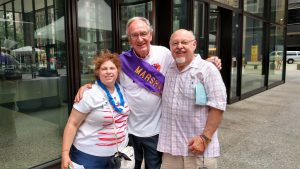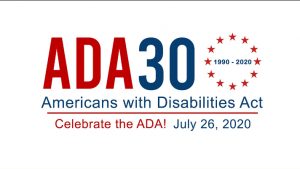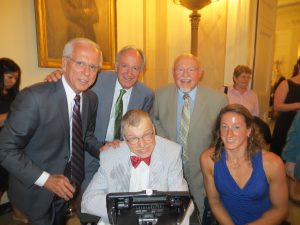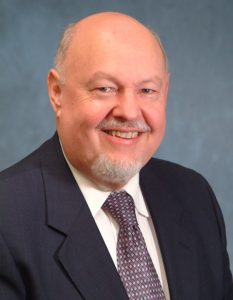We continue to celebrate the 30th Anniversary of the Americans with Disabilities Act (ADA), a landmark civil rights law that protects people with disabilities against discrimination and gives them equal rights in all aspects of life. We had the honor and privilege of interviewing Allan Bergman, a disability advocate who was instrumental in making the ADA a reality. Below are excerpts from our conversation with him:
Q. Tell us a little bit about yourself and how you got involved in the disability field:
A. I more or less “fell” into this field when I was in graduate school at the University of Texas at Austin. I began my studies in Clinical Psychology, but I got disenchanted with the mental health field at that time. I eventually shifted my focus to vocational rehabilitation and special education. Here I was truly exposed to people with intellectual and developmental disabilities for the first time. They were a group of men who were institutionalized. I could not believe when I saw how they were treated and/or ignored. To put it mildly, these men were shown no respect nor given any dignity. From the human perspective, I could not get the images of these men out of my mind. Instead, these images sparked my drive – in disability advocacy and created an interest in learning more about how we are the products of our culture and the attitudes, perceptions and stigmas that grow out of that. It also started my interest in public policy that was supported by first supervisor, the agency’s assistant commissioner, legislative liaison, and an attorney.
The birth of my daughter, Dina, who was born with a congenital heart defect and an intellectual disability, sealed my commitment to disability advocacy. Since then, I have been truly fortunate to be in a lot of the correct places at the “right time” to meet, be influenced by and learn from many of our leaders.
Q. You were on the White House lawn on July 26, 1990, for the signing of the ADA into law. Tell us about that unique experience!
A. I was one of 3,000 people who was invited to witness the signing of this landmark civil rights legislation, which was such an honor. I was on the White House south lawn with my wife, Jan, and my daughter, Dina, and fellow advocates. We sat among Senators – the late Senator Ted Kennedy and Senators Lowell Weicker, Bob Dole, Dave Durenberger, and Tom Harkin and Representatives Tony Coelho, Major Owens, Steve Bartlett, and Steny Hoyer.
Personally, I was very proud and felt a great moment of accomplishment for lots of years of work by the disability community, modeled upon the Civil Rights Act of 1965 to address the blatant discrimination against people with disabilities in our country. Although we knew there was more to be done for the rights of people with disabilities to become real in everyday life, the atmosphere was one of celebration, hope and promise.
Q. How have you seen the lives of people with disabilities changed in general because of the ADA?
A. Title III of the ADA has provided the biggest change so far for people with disabilities. This allows all people access to public accommodations, like stores, restaurants, movie theaters, sports arenas, and businesses. Accessibility architecture has become part of our culture. Everybody now accepts curb cuts, wider doorways, grab bars in bathrooms and lower buttons in elevators. However, there is still a lot of work to be done around employment, government services and attitudes. Stigma is still alive and well.
Q. Can you give a specific example of how the ADA has had an impact in your personal life?
A. The ADA gave us tools to allow people with disabilities to grow and have a better life. My stepdaughter, Mindy, was diagnosed with the label of “profound mental retardation” (sic) when she experienced the beginning of her Rett Syndrome. She is non-verbal and has a 25 second auditory processing disorder. The Individuals with Disabilities Education Act (IDEA) gave her the right to attend public school and the ADA gave her access to participate in customized employment (having been told she could not work in a sheltered workshop). The ADA assured Mindy of the right to communicate and several years ago, she learned how to use an augmentative communication device with eye gaze technology, which was purchased for her by Medicare. Mindy has exceeded everyone’s expectations. She now has a voice and she is proud to work part-time at a funeral home where the environment is quiet and accommodates her auditory processing delay.
Q. In your opinion, what still needs to be done with regard to the ADA?
A. A lot! As good as the ADA is and as far as we have come on the journey of inclusion, we still need to change our culture, attitudes, expectations, and behaviors. Laws do not do that.
We need to make the American Dream – which are stated as the four goals of the ADA – equality of opportunity, full participation, independent living, and economic self-sufficiency – the goal for everyone living with a disability, regardless of severity or complexity. The largest group of people living in poverty today in the United States are people with disabilities, despite Special Education, Vocational Rehabilitation, Medicaid-funded Home and Community-based Services (HCBS) and the ADA. And, over 2/3 of adults of working age with disabilities are neither working nor seeking employment!

Allan with his daughter Dina and Senator Harkin at the ADA 25th anniversary, Disability Pride Parade at Daley Plaza, in Chicago
We can change behaviors and attitudes by raising expectations of and for people with disabilities. We need to focus on each person’s strengths, preferences, interests and gifts, rather than deficits and “fixing the broken person” medical model that does not work. We also need to change our language around disability. Language traps us into a way of thinking. We must not let the disability diagnosis define the person any more than a person’s eye color, hair color, skin color, or religion. It is a characteristic and any one of us can join the Disability community at any time as it maintains open enrollment 24 hours/day and 365 days/year, and it does not discriminate.
We also need to do K-12 school inclusion right from the start, including in early intervention and preschool. Research shows that full inclusion for all works beautifully for all students, with and without disabilities, and the school and community, when provided by competent and well-trained staff.
Q. What advice would you give the younger generation of self-advocates and their supporters? (about the ADA and otherwise)
A
- Believe in yourself.
- Realize your dreams.
- Recognize we all make mistakes. When we pick ourselves up, we learn from them.
- Know, understand and assert your rights under the law.
- Make exceptions to the rule.
Lastly, the ‘Dignity of Risk’ needs to be embedded into culture. People with disabilities may need supports, but those supports need to fade over time. We all learn from making a mistake as do people who experience disabilities.
Q. Please add anything else you feel is important for our readers to know.
A. People need to understand the myth about losing public benefits when engaged in real work for real pay. Benefits planners are available to assist each individual to understand the vast number of “work incentives” and the ABLE account that encourage people with disabilities to work. SSI is not social security. It is a welfare check. People should find out about work incentives. And if you ever find yourself out of work, you can get back on SSI.
Allan I. Bergman is the CEO of HIGH IMPACT Mission-based Consulting & Training. A nationally recognized change agent and thought leader in cross-disability policy and “best practices.” He is a tireless advocate for people with disabilities and brings over 45 years of experience at the local, state, and federal levels as a service provider, legislative advocate, policy analyst. During the past ten years he has served as a subject matter expert on Employment First for the U.S, Department of Labor, Office of Disability Employment Policy. For the past three years he has served as the Director of the Illinois Partners in Policymaking program for leadership development of self-advocates and parents of children with developmental disabilities. As stated above, he also is Dina’s father and Mindy’s stepfather.








No Comments
No comments yet.